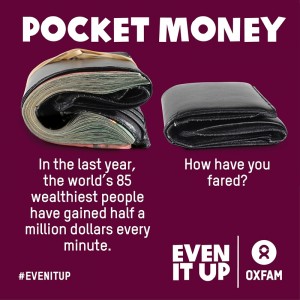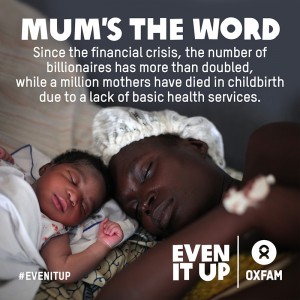倡議工作2014年10月30日
Time to Even it Up

樂施會
樂施會是國際扶貧機構,致力透過政策倡議、社區扶貧及人道救援服務,與大眾共建「無窮世界」。
 This week Oxfam launches a campaign to highlight one of the biggest issues of our time – extreme economic inequality. Seven out of ten of us now live in countries that are more unequal than they were 30 years ago and the richest 85 people own the same wealth as the poorest 3.5 billion. But why is this important for an organisation like Oxfam?
This week Oxfam launches a campaign to highlight one of the biggest issues of our time – extreme economic inequality. Seven out of ten of us now live in countries that are more unequal than they were 30 years ago and the richest 85 people own the same wealth as the poorest 3.5 billion. But why is this important for an organisation like Oxfam?
Oxfam cares about inequality because it threatens to undo the progress made on development and looks to be a barrier to poverty eradication. Even in countries with growing economies, where the gap between rich and poor is great, poverty continues to blight communities. In Zambia, despite strong GDP growth in recent years, the number of people living in extreme poverty has risen and 50 per cent of children under five are still malnourished.
It’s not only Oxfam who cares about growing inequality. From the Pope to Obama to the Director of the IMF, world leaders are raising the issue of inequality as a global concern – politically and economically. But it’s beyond power and money.
Many policies and rules have long been rigged in favour of a wealthy elite and this will continue to happen if we don’t act now. International tax loopholes allow big multinational companies to dodge tax. The political and economic power captured by a small group is costing people their freedom from poverty while undermining democracy. In a world where the number of billionaires has doubled since the financial crisis, a billion people exist below the poverty line.
The rules have to change. Power and money have to be distributed to benefit the many rather than the few.
An illustration of the vast spoils out there is that a mere 1.5 per cent levy on billionaires’ wealth over $1bn in 2014 would raise $74bn – that’s enough to get every child into school and deliver health services in the poorest countries. If we want to address this crisis of our time, shouldn’t we put the public interest where ensuring the majority is healthy and educated before the excessive profit-making needs of the few?
Inequality is not inevitable. But the gap between the rich and the rest is widening, at the great expense of the many. Governments, people, and business worldwide need to take action to even it up.
 Access to health and education; the right to decent work and decent wages; closing tax loopholes to make rich companies and individuals pay their fair share; and making sure people have the right to real political participation and influence to shape their democracy. These are some of the ways Oxfam believes we can end extreme economic inequality, which in turn will positively impact the age-old inequalities of gender, race, caste and so on.
Access to health and education; the right to decent work and decent wages; closing tax loopholes to make rich companies and individuals pay their fair share; and making sure people have the right to real political participation and influence to shape their democracy. These are some of the ways Oxfam believes we can end extreme economic inequality, which in turn will positively impact the age-old inequalities of gender, race, caste and so on.
We are joining with people and movements everywhere who are demanding a fairer world. Join us. Help us to even it up.
